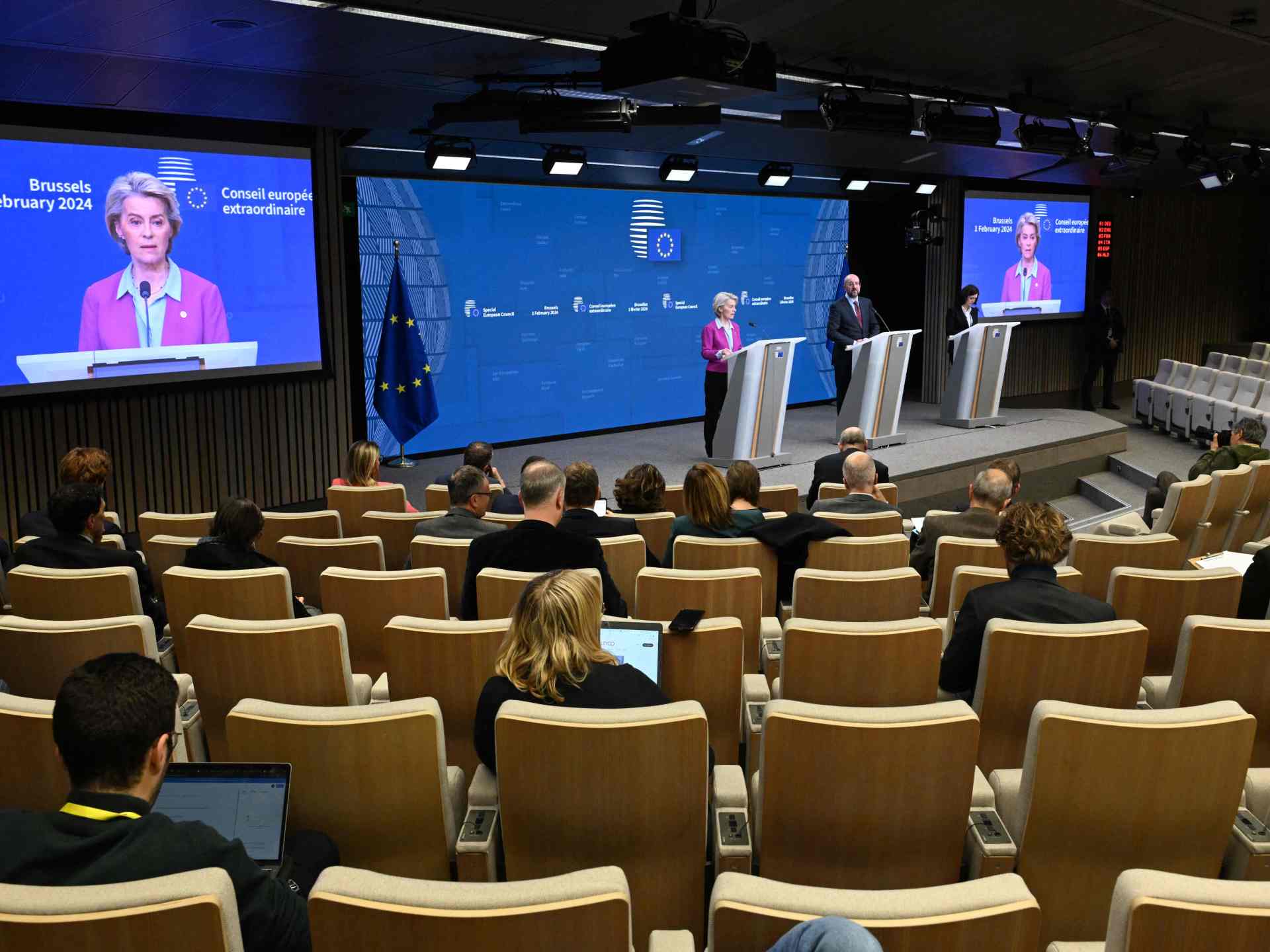Press conference in Brussels ahead of a European Council meeting to discuss aid to Ukraine (French)
The member states of the European Union approved an aid package of more than 50 billion euros for Ukraine unanimously, at an extraordinary summit held in the Belgian capital, Brussels, yesterday, Thursday, after attempts were made in the last hours to convince Hungary, which had previously refrained from agreeing.
According to the concluded agreement, the European aid allocated to Ukraine ($33 billion in loans and $17 billion in donations) will be paid over 4 years, and is included in an annex to the European Union budget until 2027.
European leaders met in Brussels in an extraordinary summit to break the deadlock, due to the opposition of Hungarian Prime Minister Viktor Orban, the only one among the 27 leaders who maintained relations with Moscow.
The settlement reached by European leaders stipulates that the European Commission prepares an annual report on Ukraine's use of funds, and the possibility of leaders within two years, if necessary and unanimously, requesting a review of aid.
Hungary demanded to be able to conduct an annual review of this support, but other EU countries did not want to give it such frequent opportunities to use its veto.
Agence France-Presse quoted a European diplomat - who requested anonymity - as saying that Orban "conceded... He saw that there was discomfort, and that there was a limit that should not be crossed."
Hungarian opposition
The Hungarian leader, who is the only one among the EU leaders to maintain relations with Russia, aroused the anger and discontent of his counterparts gathered last December by opposing this financial support.
He was accused in Brussels of blackmailing the European Union in order to secure the disbursement of European funds allocated to his country that were frozen by the European Commission due to internal legal violations committed by Budapest.
Last December, the Commission released about 10 billion euros, justifying this by Hungary implementing reforms to strengthen the independence of its judges. But more than $20 billion in European funds are still frozen, due to Brussels' concerns regarding, in particular, respect for the rights of homosexuals, academic freedom and the right to asylum in Hungary. The bulk of the funds are allocated to the post-Covid recovery plan.
Orban regularly accuses the Commission of being politically motivated, and the settlement text reached on Thursday emphasizes the “objective, fair and impartial” nature of any EU decision on these funds.
Orban is the only European official among the leaders of the European Union countries who has maintained relations with Moscow (Reuters)
Message to Washington
Ukrainian President Vladimir Zelensky - in a letter addressed to the leaders of the Union - welcomed the aid, considering his country on the path to joining the European bloc after obtaining the status of an organic candidate last year.
French President Emmanuel Macron announced that "Russia cannot bet on any European failure to support Ukraine." European Commission President Ursula von der Leyen commented by saying that it was a "strong message" to Russian President Vladimir Putin.
It is also a message to the United States as new financial aid to Ukraine is still pending in Congress. German Chancellor Olaf Scholz said, "I hope (it) will help make things easier" so that US President Joe Biden can move forward with his plan to help this country that is at war.
Kiev desperately needs Western help to support its economy after nearly two years of Russian war on the country.
Field developments
On the other hand, the governor of the Ukrainian Kherson region, Oleksandr Prokudin, and other officials said that a Russian attack killed two French volunteers and injured three other foreigners on Thursday on the town of Pereslav, located in southern Ukraine.
Public prosecutors in Kherson said that Russian forces launched a major drone attack in the region, and police said that a Ukrainian citizen was injured.
In another context, Russian investigators said - yesterday, Thursday - that they have evidence proving that the Ukrainian army shot down a Russian Ilyushin Il-76 military transport plane on January 24 with two American-made Patriot surface-to-air missiles.
Russia has accused Ukraine several times of shooting down the plane, and says that this resulted in the death of 74 people on board, including 65 Ukrainian prisoners who were on their way to be exchanged for Russian prisoners of war.
Investigators published footage of body parts that they said proved that those on board the plane were Ukrainian soldiers. Kiev did not confirm or deny shooting down the plane, but it questioned the details of Moscow’s story and called for an international investigation.
Source: Al Jazeera + agencies

